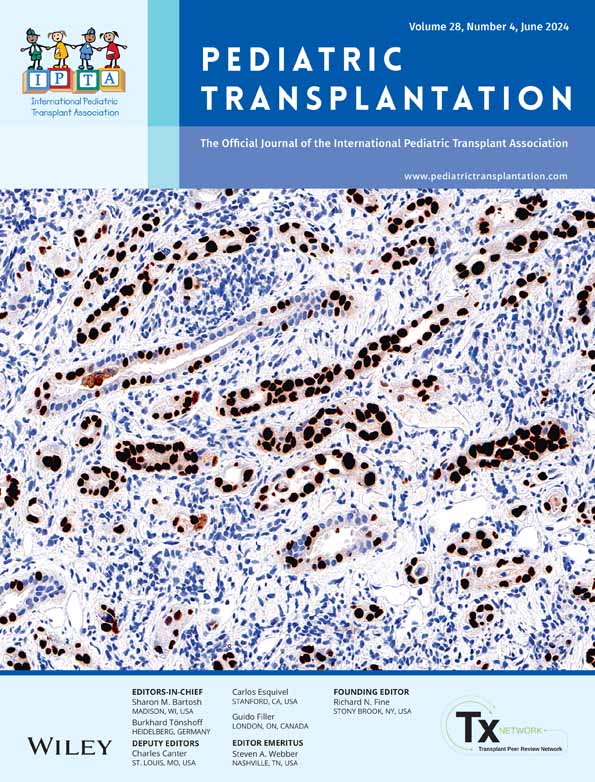Calcineurin inhibitor-related hyperkalemia is caused by hyporeninemic hypoaldosteronism and fludrocortisone is an effective treatment: Report of a case series and review of the literature
Abstract
Introduction
Calcineurin inhibitors (CNIs) are widely used in transplantation. Although CNI-related hyperkalemia is common (10%–60.6%), the underlying pathogenetic mechanism is not well-elucidated and may lead to dose adjustment or treatment withdrawal.
Objective
The aim of this study is to describe CNI-related hyperkalemia due to hyporeninemic hypoaldosteronism in pediatric transplant recipients who were successfully treated with fludrocortisone.
Method
In a total of 55 hematopoietic stem cell (HSCT) and 35 kidney transplant recipients followed according to institutional immunosuppression protocols, recipients diagnosed with CNI-related hyperkalemia were reviewed. Recipients who were receiving intravenous fluid, potassium, or were diagnosed with hemolysis, acute graft rejection, or had an eGFR < 30 mL/min/1.73m2, were excluded. A detailed analysis of clinical history as well as biochemical studies was carried out to reveal possible pathophysiology.
Results
Three pediatric transplant recipients (one HSCT, two kidney transplantation) with findings of hyperkalemia, hyponatremia, and a mild elevation in blood urea nitrogen while on CNIs were recruited. Urinary potassium excretion was diminished while sodium excretion was increased. Plasma aldosterone levels were low, and renin was not increased in response. Primary adrenal insufficiency was ruled out, and hyporeninemic hypoaldosteronism was diagnosed. CNI-related hyperkalemia was detected earlier in case 1, who had HSCT (22 days), than in the second and third cases, who had kidney transplantation (24 and 30 months post-transplantation, respectively). The discrepancy was hypothesized to be explained by higher overall CNI dose due to higher serum target CNI used in HSCT than kidney transplantation.
Electrolyte imbalance was reversed upon administration of physiologic dose fludrocortisone (0.05 mg, daily), while fludrocortisone was ceased after CNI withdrawal in case 1, which is additional evidence for the etiological association of CNIs and hyporeninemic hypoaldosteronism.
Conclusion
Our three cases strengthen the premise that CNI-related hyperkalemia may be due to hyporeninemic hypoaldosteronism, and the timing and severity may be related to CNI dose. Fludrocortisone is a safe and effective treatment in CNI-related hyperkalemia, providing maintenance of CNIs, which are one of the essential therapeutic agents for pediatric transplantation.
CONFLICT OF INTEREST STATEMENT
The authors declare that there is no conflict of interest that could be perceived as prejudicing the impartiality of the research reported.
Open Research
DATA AVAILABILITY STATEMENT
Data sharing is not applicable to this article as no new data were created or analyzed in this study.




